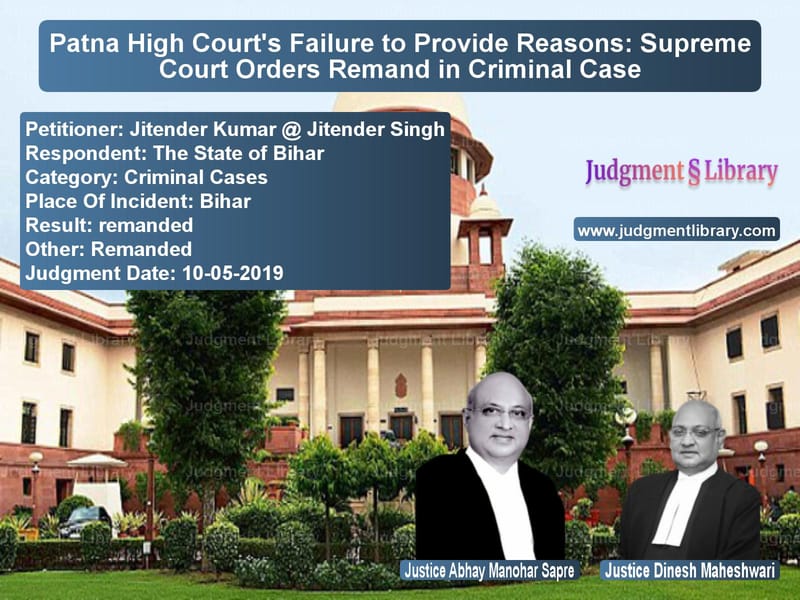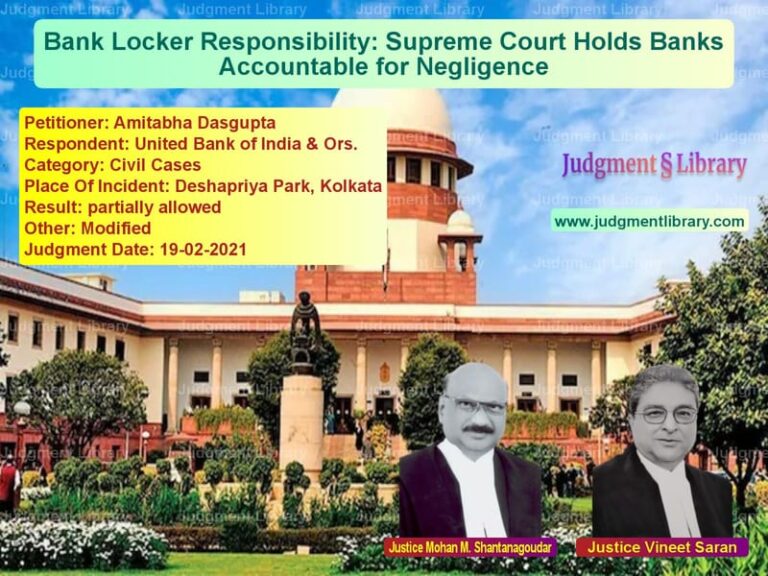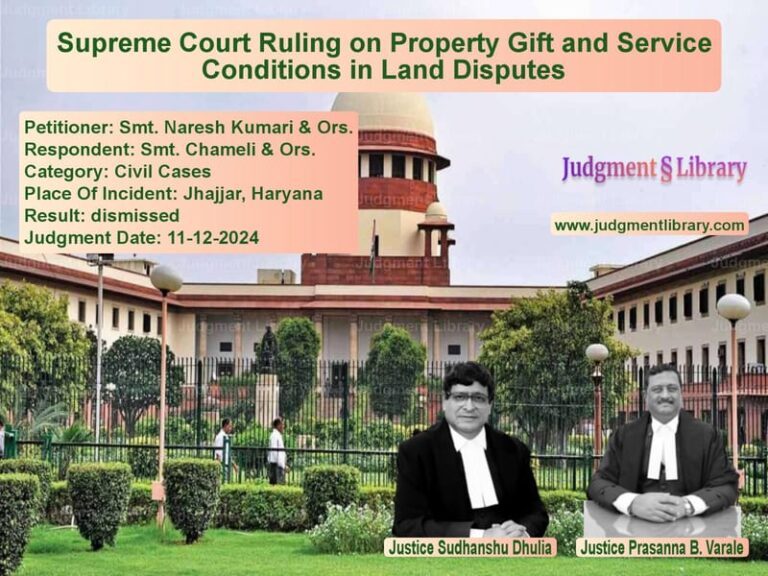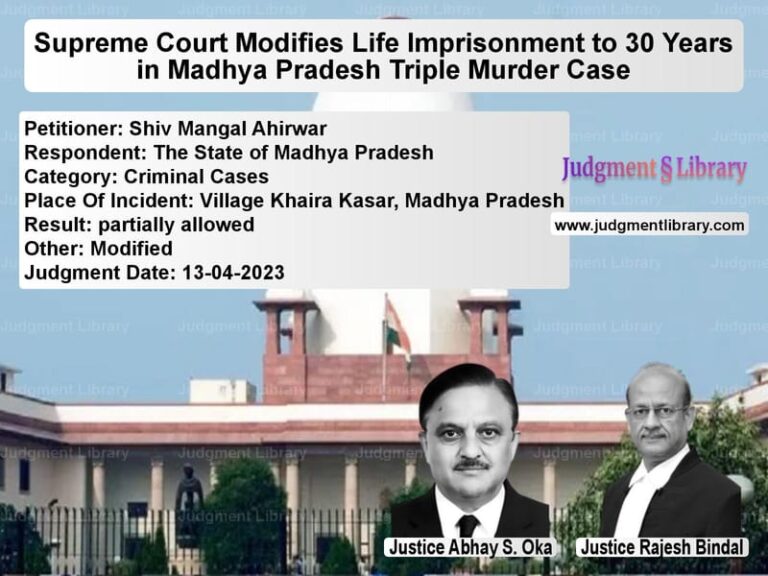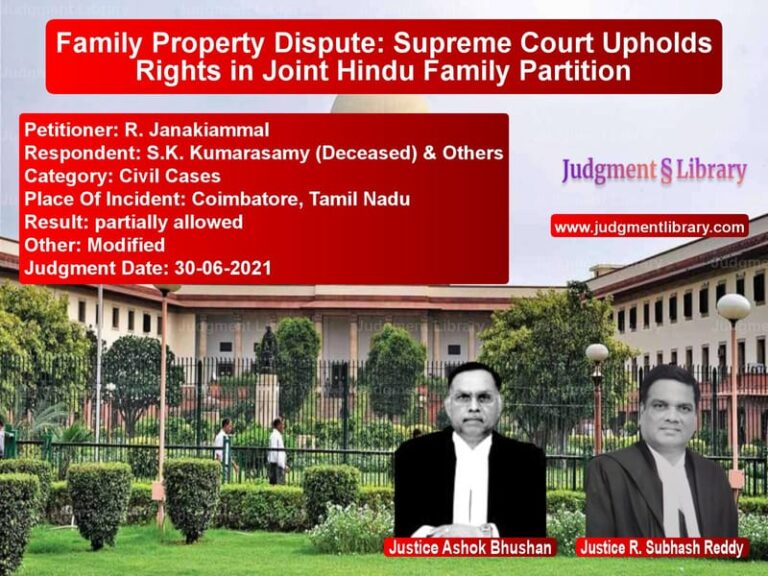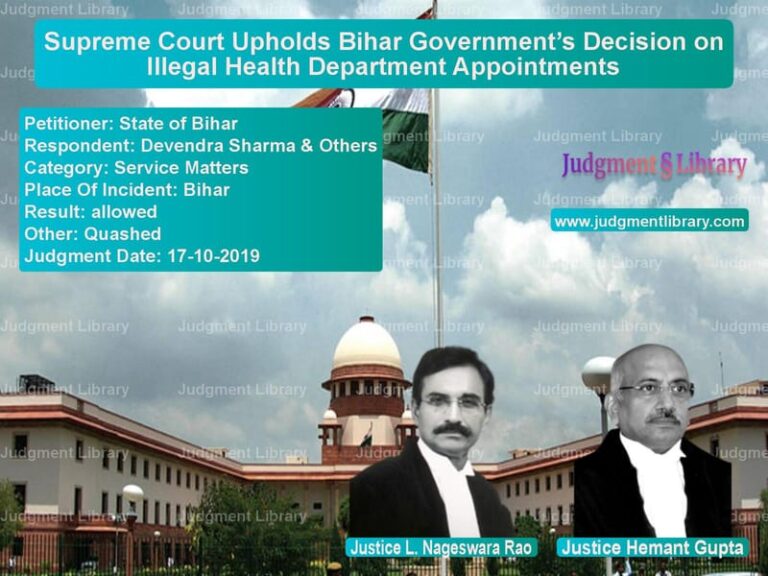Patna High Court’s Failure to Provide Reasons: Supreme Court Orders Remand in Criminal Case
The case of Jitender Kumar @ Jitender Singh vs. The State of Bihar revolved around a critical issue of procedural justice. The Supreme Court of India was called upon to determine whether the Patna High Court had properly adjudicated a petition under Section 482 of the Code of Criminal Procedure (CrPC) when it summarily dismissed the petition without assigning any reasons. The Supreme Court ultimately ruled in favor of the appellant, setting aside the High Court’s order and remanding the matter for fresh adjudication.
Background of the Case
Jitender Kumar, the appellant, had been summoned to face trial in Session Case No. 280 of 2016 before the First Additional & Sessions Judge, Jamui. He was accused under Sections 302, 325, 326, 331, 352, read with Section 34 of the Indian Penal Code (IPC). The appellant moved the Patna High Court, seeking to quash the order of the Chief Judicial Magistrate, Jamui, which had summoned him in connection with P.S. Case No. 154 of 2013.
The appellant approached the High Court under Section 482 CrPC, arguing that the order summoning him was flawed and legally unsustainable. However, the High Court dismissed his petition without providing any reasoning, merely stating that the petition lacked merit.
Key Legal Issues
- Did the High Court err in dismissing the petition without assigning reasons?
- Is a reasoned order necessary when disposing of a petition under Section 482 CrPC?
- What is the importance of reasoned judgments in judicial decisions?
Arguments Presented
- Petitioner (Jitender Kumar):
- The High Court did not provide any reasoning in its order, violating the principles of natural justice.
- Section 482 CrPC grants inherent powers to the High Court to quash criminal proceedings, and a decision under this provision must be well-reasoned.
- The absence of reasons in the High Court’s order left the petitioner without any understanding of why his plea was rejected.
- Respondent (State of Bihar):
- The High Court had discretion to dismiss petitions summarily if they lacked merit.
- The case against the petitioner was strong, and there was no procedural lapse in summoning him to face trial.
- The Supreme Court should not interfere in the High Court’s discretionary power to reject petitions.
Supreme Court’s Observations and Judgment
The Supreme Court, in its judgment delivered by Justices Abhay Manohar Sapre and Dinesh Maheshwari, strongly criticized the High Court’s approach of dismissing the petition without assigning any reasons.
The Court stated:
“In our view, such approach of the High Court while disposing of the petition cannot be countenanced. Time and again, this Court has emphasized the necessity of giving reasons in support of the conclusion because it is the reason which indicates the application of mind.”
The Supreme Court emphasized that judicial decisions must be reasoned and must indicate why a particular conclusion has been reached. The Court pointed out that:
- Paragraphs 1 to 4 of the High Court’s order merely summarized the facts.
- Paragraphs 5 and 6 listed the arguments presented by the respective parties.
- Paragraphs 7 to 9 recited what had transpired in the trial court.
- Paragraphs 10 and 11 contained quotations from two Supreme Court decisions.
- Paragraph 12 was the operative part of the judgment, which simply concluded that the petition was devoid of merit without explaining why.
The Supreme Court ruled that such an order could not be upheld as it lacked any discussion or reasoning. The Court remanded the matter back to the High Court for fresh adjudication, directing that the case be decided on merits with a reasoned judgment.
The judgment concluded:
“We, however, make it clear that we have not expressed any opinion on the merits of the issues arising in the case having formed an opinion to remand the case to the High Court for deciding it afresh.”
Importance of Reasoned Orders in Judicial Decisions
The Supreme Court’s ruling reiterates the fundamental principle that reasoned judgments are essential for fair adjudication. The requirement of assigning reasons in judicial decisions serves multiple purposes:
- Ensures Transparency: A well-reasoned order allows the litigant to understand the basis of the court’s decision.
- Facilitates Effective Appeals: Without reasons, an appellate court cannot assess whether the lower court’s decision was legally sound.
- Demonstrates Application of Mind: Providing reasons indicates that the judge has carefully considered the facts and arguments before arriving at a conclusion.
- Upholds Principles of Natural Justice: Reasoned orders prevent arbitrary decision-making and ensure that parties feel their arguments have been duly considered.
Conclusion
The Supreme Court’s decision in this case serves as a reminder to lower courts, particularly High Courts, that they must provide reasons when disposing of cases, especially when dealing with petitions under Section 482 CrPC. By remanding the case for fresh adjudication, the Supreme Court has reinforced the duty of courts to issue well-reasoned judgments that uphold transparency, fairness, and due process in the justice system.
Petitioner Name: Jitender Kumar @ Jitender Singh.Respondent Name: The State of Bihar.Judgment By: Justice Abhay Manohar Sapre, Justice Dinesh Maheshwari.Place Of Incident: Bihar.Judgment Date: 10-05-2019.
Don’t miss out on the full details! Download the complete judgment in PDF format below and gain valuable insights instantly!
Download Judgment: Jitender Kumar @ Jit vs The State of Bihar Supreme Court of India Judgment Dated 10-05-2019.pdf
Direct Downlaod Judgment: Direct downlaod this Judgment
See all petitions in Bail and Anticipatory Bail
See all petitions in Attempt to Murder Cases
See all petitions in Judgment by Abhay Manohar Sapre
See all petitions in Judgment by Dinesh Maheshwari
See all petitions in Remanded
See all petitions in Remanded
See all petitions in supreme court of India judgments May 2019
See all petitions in 2019 judgments
See all posts in Criminal Cases Category
See all allowed petitions in Criminal Cases Category
See all Dismissed petitions in Criminal Cases Category
See all partially allowed petitions in Criminal Cases Category

